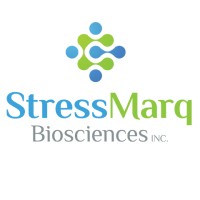Vesicular Glutamate Transporter 1 Monoclonal / FITC / S28-9
Product Details
| Description | Mouse Anti-Rat VGLUT1 Monoclonal IgG1 | |
|---|---|---|
| Conjugate | FITC | |
| Clone | S28-9 | |
| Target Species | Human, Mouse, Rat | |
| Applications | WB, IHC | |
| Supplier | Stressmarq | |
| Catalog # | Sign in to view product details, citations, and spectra | |
| Size | ||
| Price | ||
| Antigen | ||
| Host | ||
| Isotype |
About Vesicular Glutamate Transporter 1
The protein encoded by this gene is a vesicle-bound, sodium-dependent phosphate transporter that is specifically expressed in the neuron-rich regions of the brain. It is preferentially associated with the membranes of synaptic vesicles and functions in glutamate transport. The protein shares 82% identity with the differentiation-associated Na-dependent inorganic phosphate cotransporter and they appear to form a distinct class within the Na+/Pi cotransporter family. [provided by RefSeq, Jul 2008]
The protein encoded by this gene is a vesicle-bound, sodium-dependent phosphate transporter that is specifically expressed in the neuron-rich regions of the brain. It is preferentially associated with the membranes of synaptic vesicles and functions in glutamate transport. The protein shares 82% identity with the differentiation-associated Na-dependent inorganic phosphate cotransporter and they appear to form a distinct class within the Na+/Pi cotransporter family. [provided by RefSeq, Jul 2008]
About FITC
Fluorescein isothiocyanate (FITC) has an excitation peak at 495 nm and an emission peak at 519 nm. The name FITC is a misnomer in that the isothiocyanate is a reactive form of this dye. Once FITC is conjugated to an antibody, it is simply Fluorescein conjugated. FITC is one of the most widely used dyes for fluorescent applications, therefore most instruments come standard with a 488 nm laser and FITC filter set up. FITC is commonly conjugated to secondary antibodies and used in applications such as flow cytometry, immunocytochemistry, and immunohistochemistry. FITC is relatively dim, sensitive to photobleaching and it is susceptible to changes is pH. There are better performing alternatives to FITC, like Vio®Bright 515, Alexa Fluor™ 488, iFluor® 488, CF®488A and DY-488. FITC is a long-time generic dye with no sole manufacturer or trademark.
Fluorescein isothiocyanate (FITC) has an excitation peak at 495 nm and an emission peak at 519 nm. The name FITC is a misnomer in that the isothiocyanate is a reactive form of this dye. Once FITC is conjugated to an antibody, it is simply Fluorescein conjugated. FITC is one of the most widely used dyes for fluorescent applications, therefore most instruments come standard with a 488 nm laser and FITC filter set up. FITC is commonly conjugated to secondary antibodies and used in applications such as flow cytometry, immunocytochemistry, and immunohistochemistry. FITC is relatively dim, sensitive to photobleaching and it is susceptible to changes is pH. There are better performing alternatives to FITC, like Vio®Bright 515, Alexa Fluor™ 488, iFluor® 488, CF®488A and DY-488. FITC is a long-time generic dye with no sole manufacturer or trademark.
Experiment Design Tools
Panel Builders
Looking to design a Microscopy or Flow Cytometry experiment?
Validation References
Reviews & Ratings
| Reviews |
|---|
Looking for more options?
195 Vesicular Glutamate Transporter 1 antibodies from over 23 suppliers available with over 42 conjugates.





